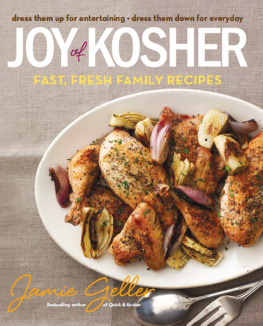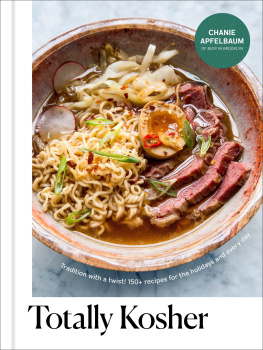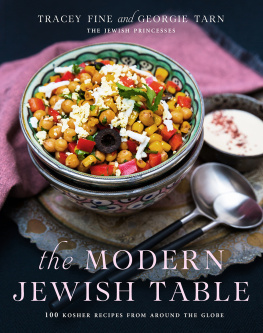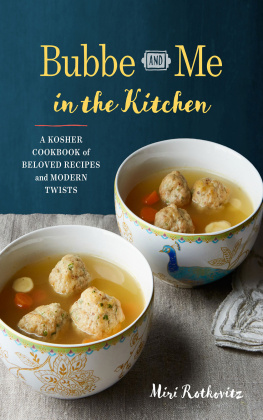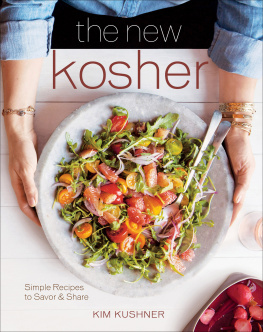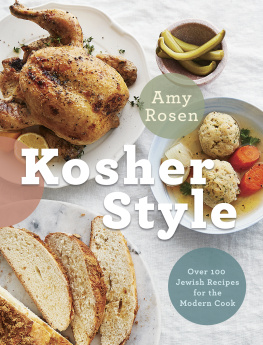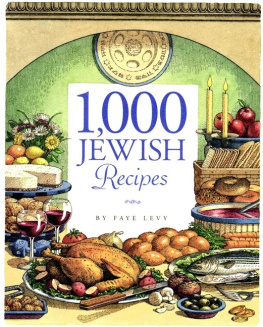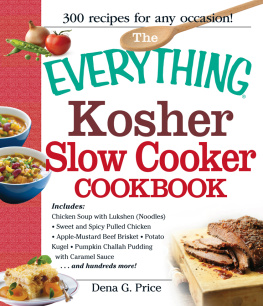Quick & Kosher: Recipes from the Bride Who Knew Nothing
Quick & Kosher: Meals in Minutes


baba ghanoush (Arabic) A Middle Eastern dish made of eggplant, olive oil, and seasonings. Considered very chic in some circles, its same ol same ol to those who grew up with it.
boureka (Hebrew) A puff pastry you can stuff with anything! Since you ask, Ill tell you that this sort of dish is found in cultures all around the world. Started in Asia (maybe) as burga. Made their way to Asia Minor and renamed brek. When Sephardic Jews reached Turkey, it reminded them of their own dish, empanada (see below). Well, its a quick slip of the tongue to go from brek-empanada to boureka. Anyway, thats the legend. They became phenomenally popular in Israel, and after a soggy swim in the Atlantic emerged on American shores.
chrein (Yiddish) Horseradish, that hot stuff Jews love to pile on their gefilte fish (see below). It has remarkable health benefits, but we were hooked on it long before those discoveries. Newcomers often need time to adjust their palates and their psyches to the extra strong varieties. Just remember, the pain of chrein is mainly in the brain.
empanada (Spanish origin) Dough folded around a stuffing, popular in Western Europe, Latin America, and Southeast Asia. Those sixteenth-century Spanish explorers really got around. Youll find reminders of their fave foods everywhere.
gefilte fish (Yiddish) Literally stuffed fish because originally fish skin was wrapped around the minced fish. Today, the skin is rarely used and the fish is boiled or baked as balls or loaves. Carp, whitefish, and/or pike (individually or in combination) are often used. GF is so ingrained in the Jewish psyche that its almost a sin to leave it off a Shabbos menu.
hummus (Turkish, Arabic) A dip that dates back to thirteenth-century Egypt, its made from mashed chickpeas, tahini, olive oil, lemon juice, garlic, and salt. People in the know pronounce it with that throat-grating sound: chummus. Thanks to a huge ad campaign by Sabra Dipping Co., youll find it right alongside the guacamole and salsa at Super Bowl parties.
meza (Turkish, Persian) Middle Eastern appetizers. In most places, you need to serve at least a half dozen different kinds to be considered hospitable. In some places, meza can be a whole meal.
pita (Greek) The Middle Eastern pocket flat-bread you use to cheat on diets.
schug (Hebrew) Middle Eastern hot sauce made from hot peppers, seasoned with coriander, garlic, and other spices. In Yemen, it was believed to have serious medicinal properties; if you could stomach it, you felt great afterward.
tabouleh (Arabic) Originally from Syria/ Lebanon, this is a salad made with bulgur, tomatoes, olive oil, lemon juice, and finely chopped parsley and mint.
zaatar (Arabic) A blend of herbs, sesame seeds, and spices including oregano, hyssop, rosemary, and basil.
Hebrew is the original language of the Bible, spoken by Jews throughout the centuries and today by Jews in Israel and the world over.
Yiddish is a language that evolved throughout the Jewish sojourn in the European diaspora. It is based largely on German, but contains numerous words in Hebrew and other languages.
Yinglish is a modern combination of Yiddish and English. It is not a language. Except to some people.
a bissel (Yiddish) A little; not much. As in Ill just take a bissel more of that incredible dessert, thanks. Okay, maybe a bissel more... noch (another) a bissel...
a shaynem dank (Yiddish) Literally thank you very much, but often with a touch of irony, as when your mother-in-law insists on showing you how to fix her sons favorite meal because youll never be able to do this yourself, or when said hubby presents you with a beautiful new sweater in a huge size to make sure it will fit.
Ashkenazim (Hebrew) Jews whose ancestry goes back to Central or Eastern Europe. They are so tightly associated with borscht, bagels, and babka that many people believe that Ashkenazic Jews invented them. Never believe folk legends! Those foods are classic Ukrainian, Polish, and Czech, respectively
Bar Mitzvah (Hebrew) A festive occasion for which the mother of the Bar Mitzvah boy typically loses fifteen pounds so she can squeeze into a fabulous dress. Oh, and the thirteen-year-old Bar Mitzvah himself (the term refers to both the boy and the celebration) is now counted as a Jewish man. Theres no adolescence in Judaism. Either youre a child or an adult. Girls become Bas Mitzvah (aka Bat Mitzvah), an official Jewish woman, when theyre only twelve, cause girls are better than boys.
chessed (Hebrew) A kindness, Jewish-style, i.e., typically over-the-top. Such as when your neighbor asks you to take in her mail while shes on vacation, so while youre at her place, you also water the lawn, weed the flower bed, and, on the last day, leave supper at the door because you know shell be hungry when she gets home.
chick chock (Hebrew) An Israeli expression meaning superquick, because Israelis like to do everythingfrom checking out at the supermarket to flying a planewith as little interference as possible.
Ess, ess, mein kindt. (Yiddish) Eat, eat, my child. What we grew up hearing day in and day out. Its in our bones and on our hips. See Mangia! Mangia! below.
fancy schmancy (Yinglish) Really fancy, with a touch of sarcasm, as in now that you bought that fancy schmancy grill, do you know how to cook on it? See hotsy-totsy.
farklempt (Yiddish) Overcome with emotion, choked up. Im so farklempt, I cant talk right now; just give me a minute. Totally opposite of stiff upper-lipped, Jews are easily, often, and visibly farklempt on any occasion involving gifts or grandchildren, or any time Sunrise, Sunset is played.
farmished (Yiddish) Confused, distracted. I was so farmished, I put in salt instead of sugar.
far-fetched Not a Yiddish word, but it should be.
hotsy-totsy (Yinglish) Like fancy schmancy, but usually referring to a person, not a thing. Since her promotion, shes such a hotsy-totsy executive, even her kids need an appointment to talk to her.
Kohen (pl. Kohanim) (Hebrew) In ancient Israel, a priest in the Holy Temple of Jerusalem. Today, one who is descended from Kohanim.
Mangia! Mangia! Italian for Ess, ess, mein kindt. Ever since ancient Rome met ancient Jerusalem, theres been heated debate over which mothers stuff their kids more.
maven (Yiddish) An expert; a judge of quality You can be a maven of anything: cooking, shoes, jewelry, gardening, music, nail polish.
mensch (Yiddish) Literally a man but so much more! Someone who is courteous, thoughtful, understanding, and who always says and does the right thing. Every Jewish mother wants her kid to be a mensch. If a person is dubbed nisht kan mensch (not a mensch), hes an uncouth louse.
mitzvah (Hebrew) A commandment stipulated in Jewish law, but it has come to mean any kind act because kind, thoughtful behavior is inherent in the body and spirit of the law. Youre actually giving me your great-grandmothers secret recipe? What a mitzvah!
nebach (Yiddish) Poor thing! (Youve just got to pity that person.)
nosh (Yiddish) Snack. Both a noun and a verb, as in English. I need to

